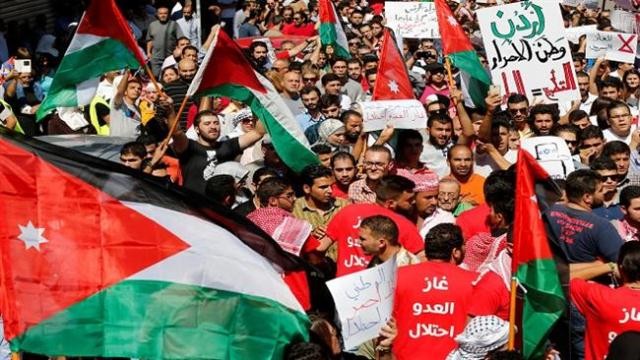Security services do not allow march that was to show support for the violent anti-Israel demonstrators at the Gazan border.
By: Batya Jerenberg, World Israel News
A march in the Jordanian capital by citizens who wanted to show their solidarity with the three-week-old Palestinian protest at the Gazan border with Israel was nipped in the bud by security services on Friday, according to the Anadolu news agency.
While chanting slogans such as “It’s my right to return to Palestine” and “Jerusalem is our capital,” the demonstrators started making their way after prayers at an Amman mosque to the city’s central Al-Nahl Square. Before they got there, however, representatives of Jordan’s security services convinced them to call off their march, the report said.
Certainly officially, the Jordanian monarch and government sympathize with the Palestinian cause and their efforts to have a state of their own. Considering that 70% of the country’s populace is Palestinian, this makes good political sense, and so even though Jordan is formally at peace with Israel, the statements emanating from Amman after the Gazan demonstrations began have definitely jibed with the sentiments of these local protestors.
For example, immediately after the first day of violent protests on March 30, Jordan’s government spokesman accused Israel of “using excessive force against peaceful demonstrators who were marching to … affirm their legitimate rights in accordance with international law and norms.”
And a few days after that, Jordan’s Foreign Minister Ayman Safadi criticized Israel harshly at a joint press conference with his Egyptian counterpart, condemning the “unacceptable escalation in Gaza,” while putting the blame exclusively on the Jewish state. No mention was made of the many attempts to infiltrate the border and attack Israelis, the rocks and firebombs thrown, or Hamas’ hateful, inciting rhetoric that encourages violence.
Instead, Ayman Safadi claimed that the protestors were peaceful people “who went to practice their right of expression to reject the occupation,” notwithstanding Hamas’ own admissions that its terrorists and “commandos” comprised a large number of the casualties reported.
Turkey’s state-run agency noted that no official explanation was given as to why permission to demonstrate was denied. One possibility, of course, is that the authorities feared that they wouldn’t be able to control the situation, and anger, once expressed, could turn against their own government instead of exclusively focusing on Israel.





